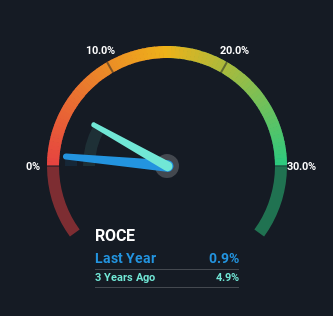- Hong Kong
- /
- Renewable Energy
- /
- SEHK:295
Kong Sun Holdings (HKG:295) Is Finding It Tricky To Allocate Its Capital
Ignoring the stock price of a company, what are the underlying trends that tell us a business is past the growth phase? Businesses in decline often have two underlying trends, firstly, a declining return on capital employed (ROCE) and a declining base of capital employed. Trends like this ultimately mean the business is reducing its investments and also earning less on what it has invested. So after we looked into Kong Sun Holdings (HKG:295), the trends above didn't look too great.
Return On Capital Employed (ROCE): What Is It?
If you haven't worked with ROCE before, it measures the 'return' (pre-tax profit) a company generates from capital employed in its business. To calculate this metric for Kong Sun Holdings, this is the formula:
Return on Capital Employed = Earnings Before Interest and Tax (EBIT) ÷ (Total Assets - Current Liabilities)
0.0089 = CN¥47m ÷ (CN¥6.0b - CN¥740m) (Based on the trailing twelve months to June 2023).
So, Kong Sun Holdings has an ROCE of 0.9%. Ultimately, that's a low return and it under-performs the Renewable Energy industry average of 6.3%.
See our latest analysis for Kong Sun Holdings

Historical performance is a great place to start when researching a stock so above you can see the gauge for Kong Sun Holdings' ROCE against it's prior returns. If you'd like to look at how Kong Sun Holdings has performed in the past in other metrics, you can view this free graph of past earnings, revenue and cash flow.
What Does the ROCE Trend For Kong Sun Holdings Tell Us?
The trend of returns that Kong Sun Holdings is generating are raising some concerns. To be more specific, today's ROCE was 4.2% five years ago but has since fallen to 0.9%. On top of that, the business is utilizing 67% less capital within its operations. When you see both ROCE and capital employed diminishing, it can often be a sign of a mature and shrinking business that might be in structural decline. Typically businesses that exhibit these characteristics aren't the ones that tend to multiply over the long term, because statistically speaking, they've already gone through the growth phase of their life cycle.
The Key Takeaway
In summary, it's unfortunate that Kong Sun Holdings is shrinking its capital base and also generating lower returns. This could explain why the stock has sunk a total of 85% in the last five years. Unless there is a shift to a more positive trajectory in these metrics, we would look elsewhere.
One more thing: We've identified 3 warning signs with Kong Sun Holdings (at least 2 which are significant) , and understanding them would certainly be useful.
While Kong Sun Holdings may not currently earn the highest returns, we've compiled a list of companies that currently earn more than 25% return on equity. Check out this free list here.
Valuation is complex, but we're here to simplify it.
Discover if Kong Sun Holdings might be undervalued or overvalued with our detailed analysis, featuring fair value estimates, potential risks, dividends, insider trades, and its financial condition.
Access Free AnalysisHave feedback on this article? Concerned about the content? Get in touch with us directly. Alternatively, email editorial-team (at) simplywallst.com.
This article by Simply Wall St is general in nature. We provide commentary based on historical data and analyst forecasts only using an unbiased methodology and our articles are not intended to be financial advice. It does not constitute a recommendation to buy or sell any stock, and does not take account of your objectives, or your financial situation. We aim to bring you long-term focused analysis driven by fundamental data. Note that our analysis may not factor in the latest price-sensitive company announcements or qualitative material. Simply Wall St has no position in any stocks mentioned.
About SEHK:295
Kong Sun Holdings
An investment holding company, invests in, operates, and maintains solar power plants in the People’s Republic of China.
Adequate balance sheet and slightly overvalued.
Market Insights
Community Narratives



